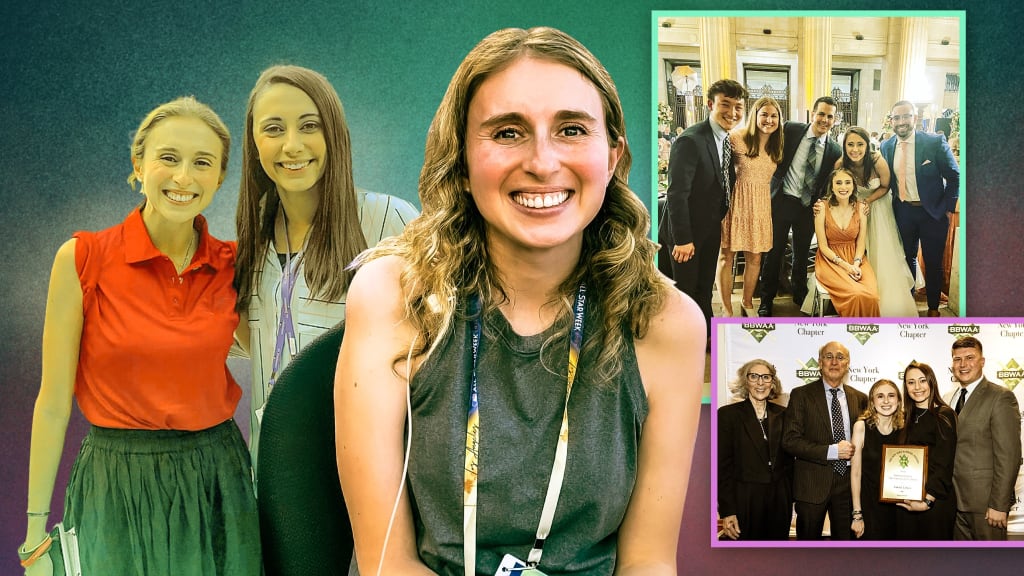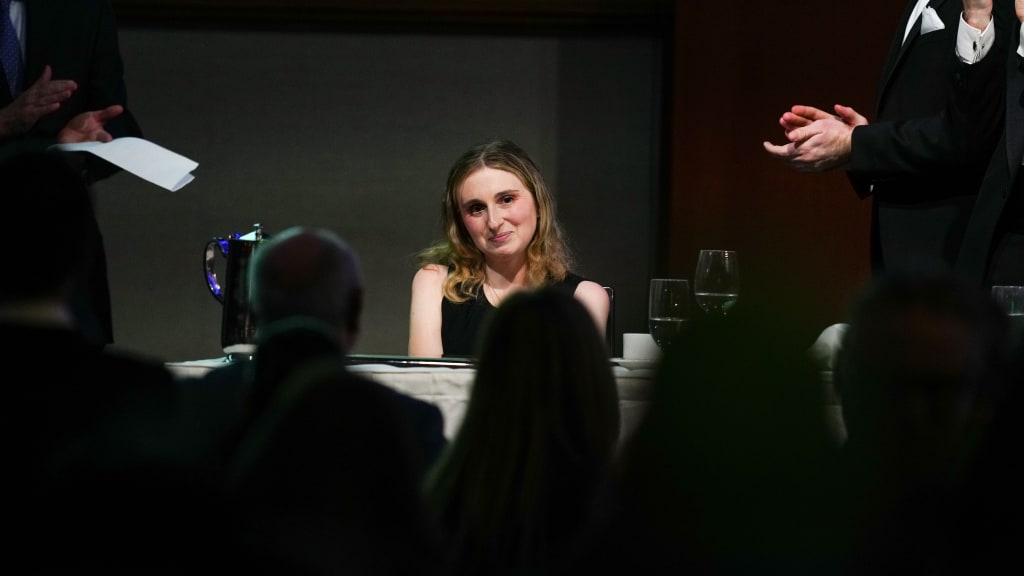It’s been 82 years since Lou Gehrig passed away, and much has changed in the world since then. But there is one thing that, somehow, has not.
On Gehrig’s 36th birthday -- June 19, 1939 -- he announced that he had Amyotrophic Lateral Sclerosis. It had been discovered in the 1800s, but no one had really heard of it until Gehrig’s almost two-year battle with the disease, which took his life on June 2, 1941. His story is so well known that ALS is now referred to as “Lou Gehrig’s Disease.”
And yet more than eight decades later, we still haven’t learned much more about the disease that bears his name. And while Gehrig remains the symbol of ALS for most, there is another person in the baseball world who has become the present-day face of ALS: My best friend, Sarah Langs.
Prior to 2021, I truly didn’t know much about Lou Gehrig’s Disease. I only started learning about it because on Aug. 13 of that year, Sarah called me to tell me she was diagnosed with ALS. As I reflect on that call and the time since, there is so much I wish I could tell Lou Gehrig about Sarah.
And since I can’t tell Gehrig directly, I will share it here.

Sarah and I met through our jobs at Major League Baseball. I’m a reporter in Cleveland. She’s a researcher based in New York. But when she let our boss know in 2019 that she’d be attending the same game I’d be covering on her annual Spring Training trip with her mother, our boss reached out to me just in case I’d want to meet her. I was happy to and we chatted for three or four minutes. In that moment, I had no idea I had just met my best friend.
It was a brief, awkward interaction, like any first meetup is. But after I walked away, her excitement and passion for baseball stayed with me. It was refreshing. I was always the young, wide-eyed reporter who loved showing up for work each day. Seasoned reporters loved joking with me that my jubilance would quickly fade. But when I talked to Sarah, I was finally with someone who viewed it the same way I did -- let’s face it, even more so than I did. There was no way I wasn’t going to stay in touch with her.
We’ve talked every day since. And trust me, that’s no hyperbolic statement. It didn’t take me long to realize she is the definition of a baseball nerd -- something I think Gehrig would love about her. If you have ever found yourself watching a game and thought, “I wonder the last time this happened?” Sarah already had the answer four innings ago, just sitting there ready to Tweet it.
Baseball is more than just a numbers game for her. If nothing else, she’s known as the girl who tweets “Baseball is the best!” 100 times a day – one for every sweet, interesting or wholesome moment this game creates. She then separated herself as a researcher, finding tidbits that no one else would think to dig up. She’s constantly on teams’ pregame shows and she’s been a regular on MLB Network for the last four years. She and I have our own podcast together, as two best friends, talking about the game they love. It’s seamless for us, considering it’s just reciting into a microphone what we’d normally just text each other.
No one deserves to live through ALS, especially not Sarah. But ever since she was diagnosed, we’ve found so many eerie ties between her and Gehrig that it’s almost as if she was destined to follow in his footsteps.
She began her career at ESPN in 2015 -- three years before others noticed that she was walking with a slight limp (her first sign of ALS). On her first day, she noticed Lou Gehrig’s famous farewell speech on the wall near her desk. It’s the speech that he gave just weeks after he was diagnosed, explaining his situation with a way-too-early goodbye to baseball. For some reason, she decided to take a picture of it with no real reason why. It’s almost as if there was an unexplained connection between them already.
Gehrig’s speech was one of the most courageous and empowering moments in this game’s history. His journey was forced to be in the public eye, whether he wanted it to be or not. Sarah unfortunately knows that plight all too well. She was able to keep her diagnosis private for a little more than a year before people started to notice her voice sounded different than it had in the past. It was then, like Gehrig, she had to address the public, explaining her situation and asking people to give others grace. Not her, she could handle the criticism she received. But she wanted to make sure the message was clear: You never know what people are dealing with.
Sarah read a book that was written by Jonathan Eig about Gehrig this offseason and there were so many things she couldn’t believe were so similar to her own story. For example, she learned that Gehrig wrote thank you notes to his doctors, expressing his gratitude despite the horrific news they continued to deliver. When Sarah was diagnosed with that same disease that’s 100% fatal, she wrote a thank you note to her doctor. I don’t know who else would do that in a moment of such personal heartbreak.
I can’t believe I made it this far without mentioning that Sarah LOVES her birthday. I wish I could bold it, circle it, underline it, scream it, whatever I can to make it clear just how much she loves May 2, which just so happens to be the day Gehrig told his manager he shouldn’t be in the lineup because his undiagnosed ALS was making it too difficult to continue to play. That ended his legendary streak of 2,130 consecutive games played.
He was known as The Iron Horse for that durability. If someone can think of something more durable than an Iron Horse, that’s the title that Sarah should have. She’d been trying to find an answer to what she thought was an ankle problem since 2018. But as doctors continued to dig into the weakening of her ankle (and eventually leg) muscles, they couldn’t find answers. They ran every test known to man -- things no person in their 20s should have to endure. Yet Sarah never told anyone. Not even me. She hit every deadline for her stories. She never asked for time off. And after her diagnosis was finally given to her in July of 2021, this reliability and consistency hasn’t changed.
Gehrig was the captain of the Yankees, which is a position that requires you to be a selfless leader. There would be no better way to describe Sarah than those two words.
She’s become a leader in the ALS community, using her platform to advocate for ALS research. Right now, she has a #FistBumps4ALS initiative that encourages people to raise awareness for the disease by sharing photos of themselves and tagging others to spread the word. She’s on the fast track to easily hitting her goal of raising $30,000. In January, she inspired me to run a half-marathon, and we raised more than $100,000 in the process.
She’s as selfless as it gets. She was in the early stages of figuring out how to travel under these new circumstances, and she still flew to Cleveland to be my bridesmaid last year. If a random package shows up on my doorstep, I already know it’s Sarah, surprising me with a gift. And when I spent my birthday in New York last year, covering the ALDS, she had pastries waiting for me at my hotel for breakfast. When I got to the game, she had a dozen cupcakes delivered to me. We should all be more like Sarah.
No moment explains her better than that painful phone call she made to me on Aug. 13.
I knew something was up. We never called each other before; we only texted or chatted online. After an awkward and brief introduction, she uttered the words, “I have ALS.”
I was speechless. She knew I was speechless, which was her biggest fear.
“I’m sorry,” she said.
“Sorry?” I said. “What on earth are you apologizing for?”
“Because I don’t want to make you sad,” she responded.

This was typical Sarah, apologizing for something she shouldn’t. Of course, I told her she was insane for saying that, which was a nice icebreaker for the moment, but in reality, her words hit me like a semi-truck. I told her I was sorry she has to go through this. I told her I had no idea what to say because what is there to say in this type of a moment?
All I knew is that nothing would change between us. In fact, it made us closer.
I’ve had a front-row seat to her empowering journey. She covered the Home Run Derby in Los Angeles last year and the World Baseball Classic in Arizona and Florida this year – all while her body tries to fail her. She refuses to cave.
But Gehrig has shown us all first-hand what the reality of this situation is. You can fight this disease as hard as you want, but eventually, it wins.
Medications offered to those with ALS extend lives by a matter of months, not years. According to Sarah’s favorite research group, Project ALS, 30,000 people are living with ALS in the United States at any given time. More than 100,000 are living with it worldwide. The average life expectancy after getting your diagnosis is just two to five years.
Sarah knows she probably won’t see the cure for ALS in her lifetime, but she’s determined to raise funds to support the research it takes to find that cure, so others don’t have to have as devastating of an outlook as she has.
I know Gehrig would be appalled to learn that more than eight decades after his death, there have been no improvements for those living with ALS. But if somehow I could just talk with him for a few minutes to explain Sarah’s story, I know he would find solace in the fact that Sarah is fighting to make a difference.
And she will be the difference. I just know it.
